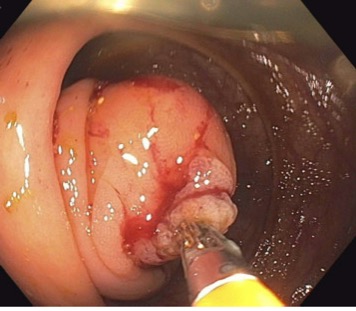Monday Poster Session
Category: Colon
P2472 - Appendiceal Endometriosis Presenting as Possible Mass
Monday, October 27, 2025
10:30 AM - 4:00 PM PDT
Location: Exhibit Hall
- JJ
Jason John, MD
Orlando VA Medical Center and UCF/HCA Greater Orlando
Orlando, FL
Presenting Author(s)
Jason John, MD1, Jignesh Parikh, MD2, Amar Mandalia, MD3
1Orlando VA Medical Center and UCF/HCA Greater Orlando, Orlando, FL; 2Orlando VA Medical Center and UCF/HCA Greater Orlando, Kissimmee, FL; 3Orlando VA Healthcare System, Orlando, FL
Introduction: Endometriosis affects 10-15% of reproductive-aged women and can present in several locations. Appendiceal endometriosis is a rare condition, with the general prevalence in women ranging from 0.05% to 1.69%. We present a case of an appendiceal mass seen on colonoscopy, later revealed to be endometriosis.
Case Description/
Methods: A 42-year-old female with past medical history of stage IV endometriosis, fibroids s/p abdominal myomectomy, and iron deficiency anemia presented to clinic for 1 month of LLQ abdominal pain similar to her previous fibroid pain prior to her surgery. She denied any menstrual irregularities, overt GI bleeding, constipation, diarrhea, fever, chills, or weight loss. She was not on any contraceptives. There was no family history of GI cancers. Physical examination was unremarkable. CT abdomen and pelvis obtained revealed a heterogenous, lobulated masslike soft tissue density along the medial wall of cecum measuring up to 3.1 cm, worrisome for colonic malignancy. Colonoscopy revealed a non-obstructing, large 3 cm mass at the appendiceal orifice (Figure 1). The rest of the colonoscopy was unremarkable. Biopsies taken of the mass at the appendiceal orifice revealed endometriosis. The patient was referred back to gynecology who recommended conservative management and no surgery given her previous multiple abdominal surgeries.
Discussion: Endometriosis is a condition in which ectopic endometrial tissues grows outside the lining of uterine cavity. It is usually associated with dysmenorrhea, chronic pelvic pain, and infertility. Endometriosis is rarely found in the appendix, but when present, may present as acute appendicitis, mucocele of the appendix, or an appendicular mass that may mimic a neoplasm. Appendiceal tumors are a very rare entity. While they account for around only 0.4% of gastrointestinal malignancies, they have a diverse histology including neuroendocrine tumors, mucinous neoplasms, and adenocarcinomas. Laparoscopy is the preferred method of both diagnosis and surgically treating this condition, though this was deferred in our patient. Endometriosis of the appendix may be asymptomatic. When symptomatic, it can cause abdominal pain, vomiting, GI bleeding, RLQ pain, cecal intussusception, and intestinal perforation, none of which were present in our patient. Long term symptom resolution was seen following appendectomy. Endometriosis of the appendix is a rare condition and should be on the differential of appendiceal masses seen on colonoscopies.

Figure: Figure 1: appendiceal mass
Disclosures:
Jason John indicated no relevant financial relationships.
Jignesh Parikh indicated no relevant financial relationships.
Amar Mandalia indicated no relevant financial relationships.
Jason John, MD1, Jignesh Parikh, MD2, Amar Mandalia, MD3. P2472 - Appendiceal Endometriosis Presenting as Possible Mass, ACG 2025 Annual Scientific Meeting Abstracts. Phoenix, AZ: American College of Gastroenterology.
1Orlando VA Medical Center and UCF/HCA Greater Orlando, Orlando, FL; 2Orlando VA Medical Center and UCF/HCA Greater Orlando, Kissimmee, FL; 3Orlando VA Healthcare System, Orlando, FL
Introduction: Endometriosis affects 10-15% of reproductive-aged women and can present in several locations. Appendiceal endometriosis is a rare condition, with the general prevalence in women ranging from 0.05% to 1.69%. We present a case of an appendiceal mass seen on colonoscopy, later revealed to be endometriosis.
Case Description/
Methods: A 42-year-old female with past medical history of stage IV endometriosis, fibroids s/p abdominal myomectomy, and iron deficiency anemia presented to clinic for 1 month of LLQ abdominal pain similar to her previous fibroid pain prior to her surgery. She denied any menstrual irregularities, overt GI bleeding, constipation, diarrhea, fever, chills, or weight loss. She was not on any contraceptives. There was no family history of GI cancers. Physical examination was unremarkable. CT abdomen and pelvis obtained revealed a heterogenous, lobulated masslike soft tissue density along the medial wall of cecum measuring up to 3.1 cm, worrisome for colonic malignancy. Colonoscopy revealed a non-obstructing, large 3 cm mass at the appendiceal orifice (Figure 1). The rest of the colonoscopy was unremarkable. Biopsies taken of the mass at the appendiceal orifice revealed endometriosis. The patient was referred back to gynecology who recommended conservative management and no surgery given her previous multiple abdominal surgeries.
Discussion: Endometriosis is a condition in which ectopic endometrial tissues grows outside the lining of uterine cavity. It is usually associated with dysmenorrhea, chronic pelvic pain, and infertility. Endometriosis is rarely found in the appendix, but when present, may present as acute appendicitis, mucocele of the appendix, or an appendicular mass that may mimic a neoplasm. Appendiceal tumors are a very rare entity. While they account for around only 0.4% of gastrointestinal malignancies, they have a diverse histology including neuroendocrine tumors, mucinous neoplasms, and adenocarcinomas. Laparoscopy is the preferred method of both diagnosis and surgically treating this condition, though this was deferred in our patient. Endometriosis of the appendix may be asymptomatic. When symptomatic, it can cause abdominal pain, vomiting, GI bleeding, RLQ pain, cecal intussusception, and intestinal perforation, none of which were present in our patient. Long term symptom resolution was seen following appendectomy. Endometriosis of the appendix is a rare condition and should be on the differential of appendiceal masses seen on colonoscopies.

Figure: Figure 1: appendiceal mass
Disclosures:
Jason John indicated no relevant financial relationships.
Jignesh Parikh indicated no relevant financial relationships.
Amar Mandalia indicated no relevant financial relationships.
Jason John, MD1, Jignesh Parikh, MD2, Amar Mandalia, MD3. P2472 - Appendiceal Endometriosis Presenting as Possible Mass, ACG 2025 Annual Scientific Meeting Abstracts. Phoenix, AZ: American College of Gastroenterology.
